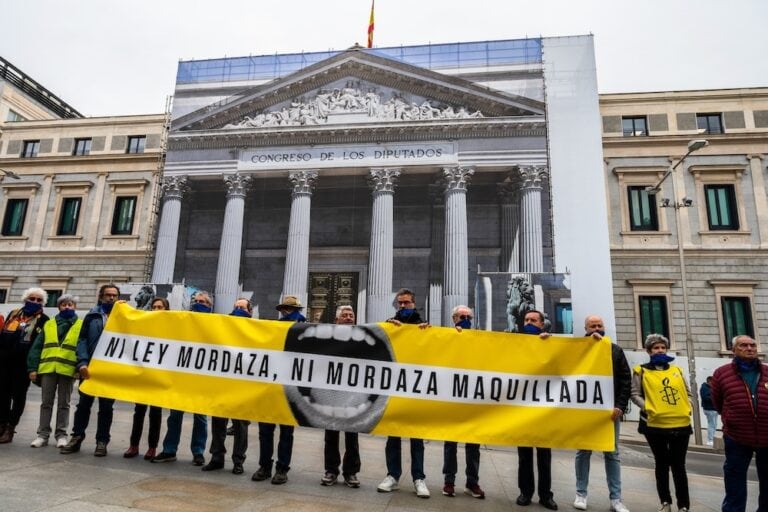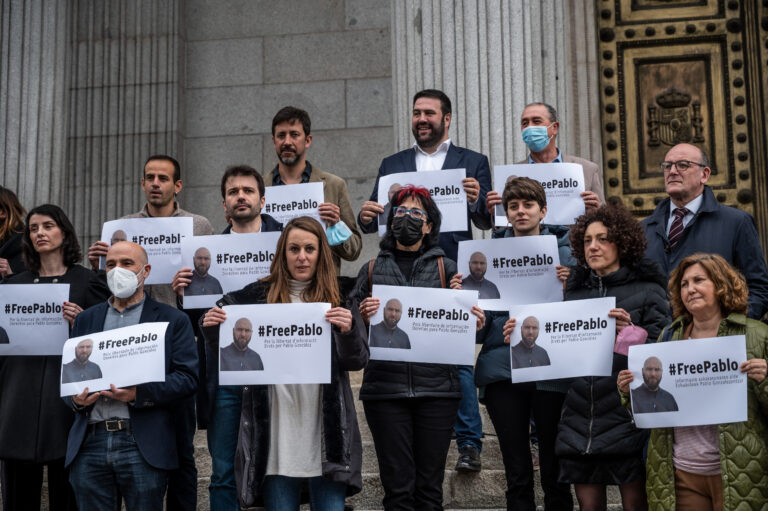(WiPC/IFEX) – The release on bail of three of the six Basque writers and journalists for the Basque newspaper “Euskaldunon Egunkaria” arrested on 21 February 2003 is welcomed by WiPC of International PEN. The organisation remains concerned, however, that three others are still detained, apparently incommunicado, one month after their arrest. Several of the detainees […]
(WiPC/IFEX) – The release on bail of three of the six Basque writers and journalists for the Basque newspaper “Euskaldunon Egunkaria” arrested on 21 February 2003 is welcomed by WiPC of International PEN. The organisation remains concerned, however, that three others are still detained, apparently incommunicado, one month after their arrest.
Several of the detainees have claimed to have suffered ill-treatment while in detention. The Spanish authorities have responded to these allegations by threatening to take legal action against four of the newspaper’s directors, accusing them of libelling the Civil Guards. International PEN believes that such legal action would be a hindrance to a full and impartial investigation into the allegations.
Pello Zubiria, former editor of “Euskaldunon Egunkaria” and editor of “Argia” magazine until poor health recently caused him to leave his post, was freed on bail on 18 March. He was hospitalised for most of his detention, suffering acute bronchial pneumonia. In an interview after his release, Zubiria said that doctors had informed him that he had attempted suicide, but he claims that his health was such that he was unable to recall much of what happened to him during his detention.
Writer and “Euskaldunon Egunkaria” managing editor Joan Mari Torreldai was freed on 15 March. In a prison interview with “Egunero”, two days before his release, Torreldai claimed to have suffered beatings and other abuse while under interrogation. (“Egunero” is the title under which “Euskaldunon Egunkaria” was printed after being closed down by the authorities.)
Jesuit priest and secretary of the “Euskaldunon Egunkaria” Board of Directors Fr. Txema Auzmendi was released on bail on 14 March.
On 10 March, the Spanish authorities announced that legal action would be taken against four “Euskaldunon Egunkaria” directors for having accused Civil Guards of torture. Amnesty International has condemned this action, stating, “To sue alleged torture victims, or to describe allegations as false even before there has been a chance to carry out a thorough investigation will only help foster and nourish a climate of impunity, in which fear of reprisals prevents the reporting of possible acts of torture.” Amnesty International points out that defendants claimed to have been subjected to the “use of ‘bolsa’ (asphyxiation with a plastic bag), exhausting physical exercises, threats and simulated execution, all forms of torture which are difficult to prove, but which, once alleged, require serious and impartial investigation.” The organisation goes on to state, “The Government knows what it must do to guard against false complaints: introduce greater safeguards for detainees that would, at the same time, help protect law enforcement officers from malicious accusations.” It adds, “Amnesty International does not believe that torture is systematic in Spain, but the Government must resist the temptation of regarding all torture allegations as part of some ETA-inspired strategy.”
In November, the United Nations Committee Against Torture expressed “profound concern” about the use of extended incommunicado detention in Spain, and made recommendations whose implementation would serve to alleviate the situation. The Spanish government is, however, planning to extend the period of time a person can be held incommunicado.
Background Information
On 20 February, the offices of the Basque newspaper “Euskaldunon Egunkaria”, in Andoain, northern Spain, were raided by Civil Guard police officers following an order issued by National Tribunal Judge Juan del Olmo. Ten of the newspaper’s senior staff were arrested and taken to the National Tribunal in Madrid. Judge del Olmo announced that the action had been taken to investigate claims that the newspaper had been created and financed by the Basque armed group Euskadi Ta Askatasuna (ETA), which had used it to “launder” money obtained from extortion and kidnapping. He added that the newspaper had disseminated ETAâs “terrorist” ideology.
The official Spanish government position on the case is that Judge del Olmo is investigating ETA documents from 1990 that apparently show that the organisation helped to finance the setting up of “Euskaldunon Egunkaria” and established the newspaper’s editorial policy. The names of those arrested on 20 February had been listed in papers seized from ETA members between 1990 and 1993.
Several of the accused dispute that the newspaper acted as an agent of ETA and refer to their own personal and open criticism of ETA. Many writers claim that since 11 September 2001, Spanish government policy aimed at tackling the urgent struggle against ETA terrorism is being increasingly confused with a policy of suppressing certain democratic institutions promoting Basque culture.
The three who remain detained are:
Iñaki Uria: Chairman of the “Euskaldunon Egunkaria” board and its managing director. A founding member of the newspaper, and a journalist for the magazine “Argia”, he has been active in the Basque cultural movement for many years.
Xabier Alegria: member of the Basque municipal assembly and formerly with the newspaper “Egin”, which was closed down in 1999 under circumstances similar to those of the current case.
Xabier Oleaga: “Euskaldunon Egunkaria” deputy editor and former “Egin” editor.
“Euskaldunon Egunkaria” (Newspaper of the Basques), established in 1990, is published six days a week and is the only newspaper published in Basque, with a readership that extends beyond northern Spain. It had a circulation of around 15,000. The newspaper was re-opened on 21 February under the title “Egunero”.
The action against the newspaper is part of a crackdown against Basque separatism, and followed the murder of a policeman by ETA on 8 February. ETA, which has been fighting for independence from Spain for over 30 years, has carried out attacks against Basque and Spanish officials and civilians, including journalists. In May 2000, José Luis Lopez de Lacalle, a writer for the Basque edition of “Le Monde”, was murdered after he criticised ETA (see IFEX alert of 25 February 2003 and 28 June 2000).
Threats and attacks against journalists critical of ETA have led many journalists to flee the region, fearing for their safety. International PEN continues to protest against ETA attacks on writers and journalists.
Recommended Action
Send appeals to the prime minister:
– welcoming the release of the three writers and journalists held in the “Euskaldunon Egunkaria” case
– seeking immediate clarification of the reasons behind the arrests, the continued detention of three of the accused, and the closure of “Euskaldunon Egunkaria”
– expressing alarm that the Spanish authorities plan to take judicial action against four of the newspaper’s directors on charges of libelling the Civil Guards
– pointing out that such action negates the possibility of a fair and impartial hearing into the defendants’ claims of torture, and should be withdrawn
– noting that prolonged incommunicado detention leads to fears that detainees can be subject to ill-treatment while hidden from independent observers, and leaves police officials vulnerable to false accusations
Appeals To
Prime Minister José MarÃa Aznar Lopez
Complejo de la Moncloa
Avda. de Puerta de hierro s/n
28071 Madrid
Spain
Fax: +34 913 90 06 20
Copies of your appeals may also be sent to the Spanish embassy in your country.
Please copy appeals to the source if possible.


